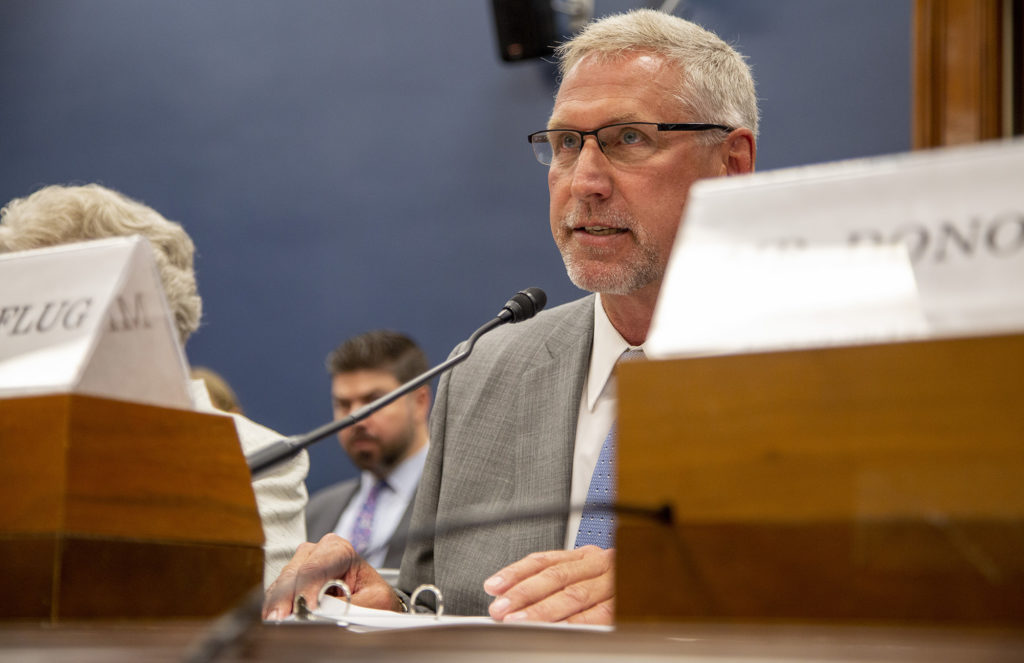
Inaccurate federal broadband data is creating big problems for electric cooperatives striving to bring high-speed internet service to rural America, a co-op leader told a House committee Tuesday.
Dan Stelpflug, director of operations, engineering and technology for Allamakee Clayton Electric Cooperative in Postville, Iowa, said faulty data from the Federal Communications Commission may force the co-op to pay back 23% of a $1.4 million broadband grant it received in 2014, causing a financial hardship for the co-op and its roughly 10,000 consumer-members.
The FCC grant was awarded based on agency data that said the co-op could reach 665 potential customers in 209 census blocks with broadband service, Stelpflug said. But the co-op later conducted its own count and found 510 potential customers, 23% fewer than the FCC data showed.
Co-op leaders discovered the discrepancy while preparing progress reports required by the FCC. Allamakee Clayton asked the agency last fall to waive some of its rules to allow the co-op to meet the requirements of the grant program based on the actual number of potential customers, but the agency has not responded, Stelpflug told members of the House Small Business Subcommittee on Contracting and Infrastructure. He said the co-op is hesitant to buy or update equipment because it may have to pay back nearly a quarter of the grant to the FCC.
“The bidding process required us to ask for a subsidy per subscriber per month,” he said. “Our bid was based on the subscriber count provided by the FCC, and at the time, the cooperative had no process or procedure in place to verify that the FCC data was correct. Had we known that the subscriber count was inaccurate, our bid per subscriber would have been incrementally higher.”
The co-op asked the FCC to verify how their count was done, but the agency refused to do so, Stelpflug said.
“In a perfect world, we would have been able to identify this discrepancy earlier,” he testified. “But the realities of a small business, the timeline, and our initial trust in the accuracy of the FCC data didn’t allow for that to happen.”
There was no process to resolve the issue, even if the co-op had discovered the discrepancy earlier, Stelpflug said.
Allamakee Clayton’s frustration with bad federal broadband data is not unique. Many co-ops have struggled with trying to ensure that broadband grants go to areas that need it most. NRECA and its member co-ops have been lobbying Congress and federal agencies to improve the accuracy of broadband data, especially of maps that purport to show which areas have high-speed internet service.
Several bills to address the problem have been introduced recently. Stelpflug praised the bipartisan Broadband Data Improvement Act of 2019, which would require more granular data to be reported and create a way for the public to give feedback.
NRECA supports the bill, which is sponsored in the House by Reps. Tom O’Halleran, D-Ariz., Cathy McMorris Rodgers, R-Wash., G.K. Butterfield, D-N.C., Annie Kuster, D-N.H., and David McKinley, R-W.Va. An identical Senate bill is being sponsored by Sens. Shelley Moore Capito, R-W.Va., Brian Schatz, D-Hawaii, Jerry Moran, R-Kan., and Jon Tester, D-Mont.
Another cause of misleading data is broadband carriers, who can report advertised maximum internet speeds for entire census blocks even if they only provide high-speed service to one customer, Stelpflug said.
“Grant money is not available in these areas because the FCC assumes the census block is adequately covered with high-speed service,” he said.
The lack of high-speed internet is hurting farmers in the co-op’s territory because they cannot engage in “precision agriculture,” Stelpflug said in response to a lawmaker’s question. That practice allows farmers to use information technology, including GPS guidance, sensors, robotics and drones, to help manage their crops and livestock more efficiently. The tools require high-speed internet access to work.
“These farmers are really dependent on this stuff, and they’re kind of falling behind,” he said. “To be competitive with everybody, they need access.”
Reaching all rural Americans with high-speed internet service has become this century’s most complex challenge for co-ops, just as bringing electricity to remote areas was last century’s biggest struggle, Stelpflug said.
“More accurate maps showing broadband availability are a key part of reaching that goal, enabling us to clarify existing gaps in coverage and harmonize the diverse solutions that will be required to help rural Americans keep pace with their urban counterparts,” he said.
Listen to a recent NRECA podcast episode on rural broadband:
Read more on rural broadband:
Case Studies on Co-op Broadband Initiatives
New State Laws Clear Hurdles for Co-ops That Choose to Pursue Broadband
NRECA Urges FCC to Advance $20B Auction to Deliver Broadband to Rural America